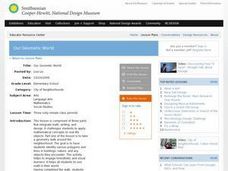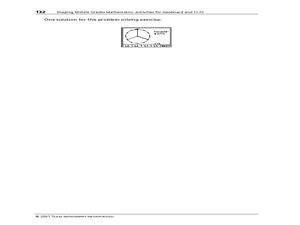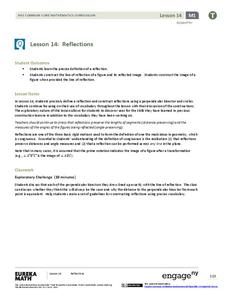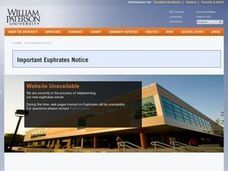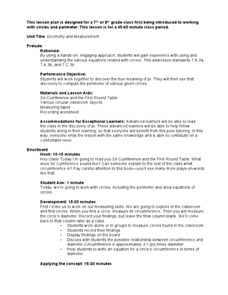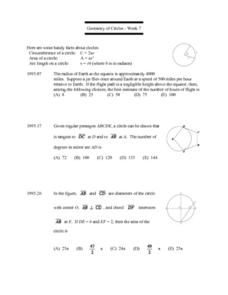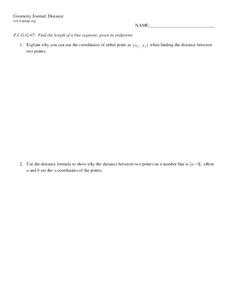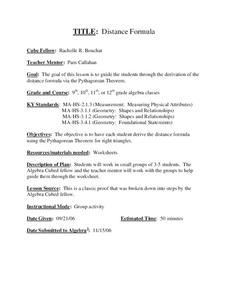Curated OER
Geometric Probability
In this geometry worksheet, 10th graders determine the probability of an event occurring based on the geometric sketch. The one page worksheet contains fourteen problems. Answers are included.
Curated OER
Our Geometic World
Students walk around the neighborhood and identify various polygons and lines in buildings, nature and other objects. They design a building using various geometric patterns, shapes and lines. Students complete a descriptive writing of...
Illustrative Mathematics
Tangent to a Circle From a Point
Learners see application of construction techniques in a short but sophisticated problem. Combining the properties of inscribed triangles with tangent lines and radii makes a nice bridge between units, a way of using...
Curated OER
Medians and Altitudes of Triangles
In this geometry worksheet, 10th graders determine if a given segment is a median or altitude of a triangle and use then find the indicated missing length or equation of a line. The two page worksheet contains twenty...
Curated OER
3.14159265
Students discover the value of Pi. In this value of Pi lesson, students measure the circumference and diameter of various circles on their graphing calculator. Students find the ratio of the circumference to the diameter and...
EngageNY
Reflections
Facilitate creativity in your math class as individuals learn the definition of a geometric reflection and correctly construct a model, as well as its reflected image. They use a perpendicular bisector and circles to elaborate on...
EngageNY
Similarity and the Angle Bisector Theorem
Identifying and verifying reproducible patterns in mathematics is an essential skill. Mathematicians identify the relationship of sides when an angle is bisected in a triangle. Once the pupils determine the relationship, they prove it to...
EngageNY
Construct and Apply a Sequence of Rigid Motions
Breaking the rules is one thing, proving it is another! Learners expand on their previous understanding of congruence and apply a mathematical definition to transformations. They perform and identify a sequence of transformations and use...
California Mathematics Project
Reflections
Reflections are the geometric mirror. Pupils explore this concept as they discover the properties of reflections. They focus on the coordinates of the reflections and look for patterns. This is the third instructional activity in a...
Curated OER
Exploring the Definition of Reflection
Students practice using a protractor and ruler to draw various points and lines. Using a computer, they draw the points and lines in the program and describe the differences between their drawing and the computer's drawing. They complete...
Curated OER
2-D Geometry
Third graders describe and compare attributes of two-dimensional shapes. They explain geometric terms, angles and shapes. Students demonstrate each vocabulary word with their body and they mirror the body positions associated with each...
Curated OER
Geometry and Measurement
Middle schoolers view a right triangle displayed by the teacher. Students measure legs and the interior angles of the triangle. They look for a pattern or relationship between the legs and angles. Middle schoolers use pegboards and...
Curated OER
Geometry of Circles: Week 7
In this circle worksheet, learners determine the number of degrees in a minor arc, find the area of a circle, find the area of a shaded region. This two-page worksheet contains six problems.
Curated OER
Geometry Journal: Distance
In this distance worksheet, students determine how to find the distance between points. They use the distance formula and justify their answers. This two-page worksheet contains 2 problems. Answers are listed on the last page.
Curated OER
Chapter 6: Geometry Perimeter and Area
In this perimeter and area instructional activity, students find the perimeter of various polygons. They compute the perimeter, surface area, circumference, and volume of given figures. Students explore trigonometric...
Curated OER
Angles: Angles, Angles, Everywhere
Students estimate and accurately measure the size of angles communicate with the appropriate geometric terms and symbols to describe and name angles, lines, line segments, rays
Curated OER
Distance Formula
Students calculate the distance between two points using the distance formula. In this geometry lesson, students derive the distance formula using the Pythagorean Theorem.
Curated OER
Circles and Angles
Students identify tangents, chords and secants. In this geometry lesson, students graph circles and identify angles created by secant lines, tangent lines and chords.
Curated OER
Preparation and Transition to Two-Column Proofs
Students investigate proofs used to solve geometric problems. In this geometry lesson, students read about the history behind early geometry and learn how to write proofs correctly using two columns. The define terminology valuable to...
Curated OER
Properties of Reflections
Students perform transformation on their polygons. In this geometry lesson, students identify the correct transformation of each shape. They move the polygons around on a coordinate plane. There are extension and homework activities...
Curated OER
Why do Stars Rise in the East?
In this stars rise in the east worksheet, students use geometry to show how the Earth rotates from west to east and why celestial bodies appear to rise in the east and set in the west. Students draw a figure and label given points in...
Curated OER
Mr. Bo Jangle, What's Your Angle?
Third graders explore angles. For this geometry lesson, 3rd graders identify and define acute, obtuse, and right angles. Students form angles with their bodies, find angles in picture books, and record angles found outside in their math...
Curated OER
Measuring Angles
Sixth graders identify and measure right, acute, obtuse, and straight angles. In this geometry lesson plan, 6th graders review the definition of each angle and are shown examples of each specific angle. Students use toothpicks, gumdrops,...
Curated OER
Wrecked Angle
In this geometry worksheet, students answer questions about triangles and trapezoids as it related to the area of a shape. They make their own polygons and calculate the area.



